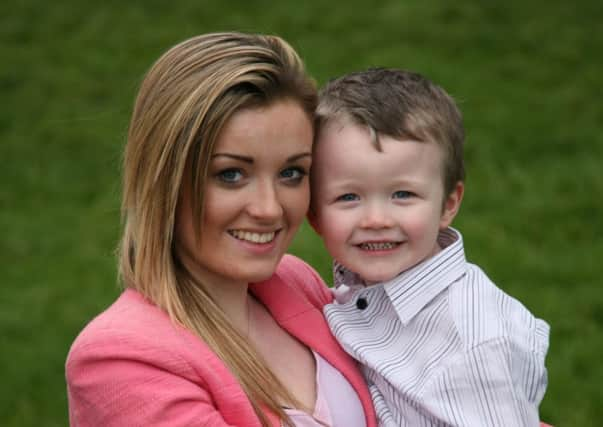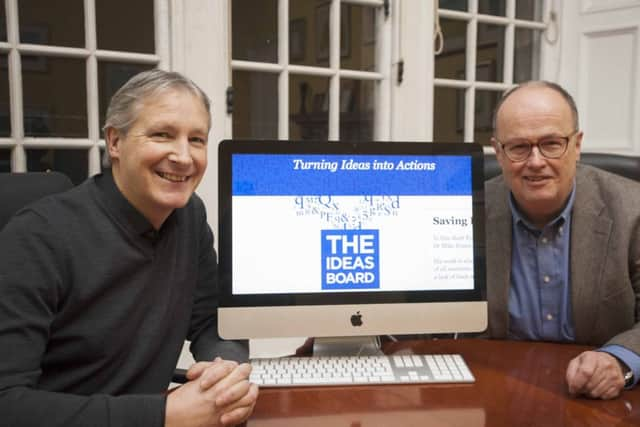Can random kindness be good for your health?


The actions of Sammie Welch, 23, and her three-year-old son Rylan, to many, were those of a civilised member of society, the sort who don’t put their feet on the seats, who wait patiently in queues, who would stop and give you the time of day if you asked them. Normal everyday politeness and thinking of others. But obviously, to the man who left her the thank you note and the cash, her actions were out of the ordinary.
He’d no doubt be staggered then by the generosity and kindness of Isabel MacPhee of Fort William who for ten months has been knitting baby cardigans and hats and handing out welcome packs to new mums in her town – even if she didn’t know them.
Advertisement
Hide AdAdvertisement
Hide AdAnd who knows what he’d make of the pupils of Boroughmuir High (a school which offers students happiness classes) who last year helped it be named the kindest school in Scotland thanks to their random acts of generosity.


Such simple gestures feel as if they are few and far between when the headlines are full of doom and gloom and general misery around the world – and it says a lot when giving up a seat on a train makes headline news.
But it’s these little acts, says Dr Andrew Curtis, who is researching the impact of kindness on our health and well-being, which underline the need for even more.
“The cynic would suggest kindness suffers from something of an image problem. In an age that often emphasises the individual over the common good, kindness can be seen as a waste of time or indeed a sign of weakness,” he says.
Advertisement
Hide AdAdvertisement
Hide Ad“Yet this can only make acts of kindness more important when they do occur. In a time of economic hardships we need to help each other more, not less.”
And David Jamilly, who launched Kindness UK, the organisation which aims to encourage people to be nicer to each other, adds: “Kindness in many people’s heads is a bit of a soft issue. A lot of people will say ‘that’s a very nice thing to do’ and forget about it. Conversely, people also do a lot of kind things that they don’t pick up on. We thought it was important to to get people thinking about kindness and make it as prominent as possible.”
David Land and Andrew White are great believers in spreading a little kindness and happiness.
The pair have recently launched The Ideas Board, a website which aims to encourage people in Edinburgh to bring forward not-for-profit ideas and get them together with people who might be able to make them work.
Advertisement
Hide AdAdvertisement
Hide Ad“It’s all about making the internet a nicer, more pleasant place,” says David, from Blackhall.
“It can be a pretty horrible place, full of abuse and arguing, but we want The Ideas Board to be a safe place to discuss how we can make the world a better place. That all sounds a bit cheesy, but little things can make a big difference to people.”
David, who is a recently-retired accountant, points to successful projects like The Silverline, the UK telephone service for the elderly who feel lonely, friendship lunches which have been launched in the north-east of England for those who need company and pub nights in Toronto, Canada, again to bring people together.
“Many of these things are happening and it shows that if people stop and think about others, they can empathise and perhaps do something for them – and that kindness can be returned,” he says.
Advertisement
Hide AdAdvertisement
Hide Ad“But there are also other, smaller things, which can just cheer people up a bit. I look at the concourses in Waverley station or St Andrew Square bus station and think there must be something that can be done to make being there more pleasant. All and any ideas are welcome, and the website is about putting people together, to make collaborations, to get things done and spread a little happiness and kindness.”
Certainly it appears, according to research, that being kind can make people happy and healthy.
Stirling’s Dr David Hamilton, author of Why Kindness is Good For You, says kind acts release the “love hormone” oxytocin into the bloodstream, making us all feel good and improving the condition of our brain, heart, cells and even genes. He adds: “Being nice to people is addictive because kindness makes you feel happier. When a person performs an act of kindness their brain produces dopamine and endorphins, which are hormones which make you happy.
“Face-to-face kindness also produces the bonding hormone oxytocin which can lower blood pressure and benefit the nervous system. Studies show that people who practise compassion also have a more active vagus nerve which plays a role in keeping your cardiovascular system healthy.”
Advertisement
Hide AdAdvertisement
Hide AdOne couple who must be at the peak of physical health, then, are Josh Littlejohn and Alice Thompson of Edinburgh’s Social Bite cafes where pre-paid meals feed the homeless and any profit goes to charity.
Around a third of the cafes’ employees have experienced homelessness themselves and the social enterprise business was overwhelmed with donations over the festive period and was able to feed hundreds of homeless people a good Christmas dinner. Their enterprise has been so successful because of people’s kindness and generosity they’ve managed to expand to other cities including Glasgow and Aberdeen.
Ewan Aitken, chief executive of the Edinburgh Cyrenians who run Fareshare, a scheme which collects quality surplus food from wholesalers and retailers and redistributes it to organisations who help support the homeless and socially excluded, agrees that kindness comes in all shapes and sizes – be it charity donations or just letting someone have your seat on the train.
But he adds: “It is acts of kindness that bind us to stranger and neighbour and from which we build community and hope. Kindness is unconditional love in action.
Advertisement
Hide AdAdvertisement
Hide Ad“People whom we have never met regularly hand in food to our Fareshare depot having been moved to help others.
“They don’t know those who will be fed by their kind act but their kindness in reaching out feeds both body and soul.”
Pay it forward pays dividends
“PAY it forward” became the catchphrase for kindness after the film of the same name hit cinema screens in 2001.
Starring Kevin Spacey, Helen Hunt and Hayley Joel Osment, it dealt with the idea that rather than paying a favour back, people should pay it forward – do a good deed for someone else, and in this way kindness spreads organically.
Advertisement
Hide AdAdvertisement
Hide AdIt’s an idea which has firmly taken root in environmental circles which see it as a way of giving more meaning to recycling or reusing old and used “stuff” that people may no longer need.
In the same vein, Zero Waste Scotland launches its Pass It On week in March.
Iain Gulland, chief executive, says: “Passing things on when you’ve finished with them is a great thing to do for
a whole variety of reasons.
“The social benefits of passing things on, coupled with the fact that it prevents items needlessly going to waste and harming the environment by breaking down in landfill, means it’s more important
Advertisement
Hide AdAdvertisement
Hide Adthan ever that we help to foster a greater culture of reuse in Scotland.
“Taking clothes and books to charity shops is an obvious example of making sure your old things go on to benefit somebody else, and is quite common.
“Many people don’t realise that there are easy ways to pass on even large household items like furniture, cookers and washing machines and help people in need.
“Our national reuse phoneline collects thousands of these kinds of items each year
Advertisement
Hide AdAdvertisement
Hide Adwhich go to local organisations to provide families on low incomes with help to set up home or are sold to help fund the work of local charities.
“I think one of the most effective ways to change our throwaway culture is to communicate to people how much good it does to pass things on, for our communities, local economies and the environment.”
Pass It On week runs from March 7 to 15. The national re-use phone line is 0800 0665 820.